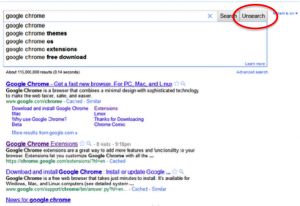Introducing Unsearch

My first post introduces ‘Unsearch’, the extension that gave its name to this blog. Unsearch is an extension for the Google Chrome browser that allows to search on Google without leaving traces on Google Search logs or on Google Web Search History. Normally, your searches on Google are recorded and logged with your IP address and cookies. While one can manage his web search history through this interface, it is not possible to manage Google search logs.
Motivations
Analyzing Google Log retention policies we found out that, even after anonymization, some pieces of information in Google search logs might lead to user identification ( for further information, see our paper). When you use Unsearch all pieces of information are deleted from Google servers within 15 days.
Also, one may not want to have all his searches recorded in his web search history. While it is possible to log out or to delete entries from Google Web Search History, I prefer to have the possibility to do ‘off the record’ searches directly on the search page. Especially now that the ‘Log-out’ button is one additional click away and that we have only three seconds before the search is recorded.
Paradoxically, with the new navigation bar, I find it more difficult to notice when I’m not logged into my account. Putting the risk of pseudonym usurpation aside, the account information is – in my opinion – less visible. That’s problematic because I can not remove searches that I did from someone else account.
How it works
When you type keywords in Google Search bar, you get Google Instant results but your query won’t be logged unless you click on the page or remain inactive for three seconds (moredetails).
When you click on Unsearch, it removes the keywords you typed in the search box (so they will not be recorded), but before that, it copies the Google Instant result and pasts it in another tab where your interactions are not monitored: you can browse the results without Google noticing (redirects are removed).
Because you never clicked on ‘Search’, Google won’t log your query and it won’t appear in your web search history either. And since you’re logged into your Google account, you’ll still get personalized search results. This approach is somehow complementary to TrackMeNot which lets user shape their search profile without issuing queries.
Shortcomings
Because Unsearch is based on Google Instant, this feature must be turned on for Unsearch to work. Furthermore, you have to click on Unsearch within three seconds or Google will log the query as a normal search. I tried to find a fix (like adding and removing space in the search bar) but I’m looking for a good solution.
In fact, the main drawback is that Unsearch takes advantage of Google Instant log retention policy. Should this policy change, Unsearch would no longer prevent Google from logging searches. Such change is very unlikely as Google never extended its log retention period or made its ‘anonymizing’ process less effective.
Furthermore, even if this policy is changed, countermeasures exist to prevent Google from logging most of the queries in their entirety (see some possible solution in Unsearch Presentation (.ppt) ).